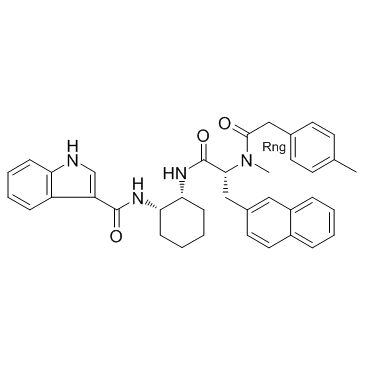| Description |
MEN11467 is a selective and orally- effective peptidomimetic tachykinin NK1 receptor antagonist.
|
| Related Catalog |
|
| Target |
Tachykinin NK1 receptor[1]
|
| In Vitro |
MEN11467 potently inhibits the binding of [3H] substance P (SP) to tachykinin NK1 receptors in the IM9 limphoblastoid cell line (pKi=9.4±0.1). MEN11467 is highly specific for the human tachykinin NK1 receptors, since it has negligible effects (pKi<6) on the binding of specific ligands to tachykinin NK2 or NK3 receptors and to a panel of 30 receptors ion channels unrelated to tachykinin receptors. The antagonism exerted by MEN11467 at tachykinin NK1 receptors is insurmountable in saturation binding experiments, both KD and Bmax of SP are significantly reduced by MEN11467 (0.3-10 nM). In the guinea-pig isolated ileum, MEN11467 (0.03-1 nM) produces a nonparallel rightward shift of the concentration-response curve to SP methylester with a concomitant reduction of the Emax to the agonist (pKB=10.7±0.1). Moreover the antagonist activity of MEN11467 is hardly reversible despite prolonged washout[1]. The pseudopeptide tachykinin NK1 receptor antagonist, MEN11467 is used to study tachykininergic involvement in antigen-induced mucus secretion in ferret trachea in vitro. MEN11467 (1 nM-10 μM) inhibits [Sar9]SP-induced 35SO4, output in a concentration-dependent manner with an approximate IC50 of 0.3 μM[2].
|
| In Vivo |
MEN11467 produces a long lasting (>2-3 h) dose-dependent antagonism of bronchoconstriction induced by the selective tachykinin NK1 receptor agonist, [Sar9, Met(O2)11]SP in anaesthetized guinea-pigs (ID50s=29±5, 31±12 and 670±270 μg/kg, after intravenous, intranasal and intraduodenal administration, respectively), without affecting bronchoconstriction induced by methacholine. After oral administration MEN11467 produces a dose-dependent inhibition of plasma protein extravasation induced in guinea-pig bronchi by [Sar9, Met(O2)11] (ID50= 6.7±2 mg/kg) or by antigen challenge in sensitized animals (ID50=1.3 mg/kg). After i.v. administration MEN11467 weakly inhibits the GR 73632-induced foot tapping behaviour in gerbil (ED50=2.96±2 mg/kg), indicating a poor ability to block central tachykinin NK1 receptors[1]. Treatment with MEN11467 (1 mmol/kg twice weekly for 2 weeks) results in a temporary growth arrest of the U373 MG xenograft that last for about 10 days until the last MEN11467 administration (TVI%=56). Thereafter, the tumor start to regrow. MEN11467 anti-tumor activity is partially reverted by the simultaneous administration of an equimolar dose of exogenous substance P (SP), suggesting the specificity of tachykinin NK1 receptor activation in glioma growth. Prolonged s.c. treatment with a higher MEN11467 dose (1.7 mmol/kg at five times a week for 6 weeks) completely inhibits the growth of U373 MG tumor for the entire length of the experiment, even following administration of a low exogenous SP dose. After 6 weeks, the tumor mass is not increased compared to the untreated control with TVI%=96%[3].
|
| Animal Admin |
Mice[3] Female athymic nu/nu nude mice, 5-7 weeks old are used. Tumor xenografts are obtained by subcutaneous (s.c.) injection of 2×107 U373 MG cells or 107 A2780 cells into the right flanks of female nude mice. Five days after tumor cell inoculation U373 MG or A2780 tumor-bearing mice are randomly divided into different groups (six animals per group) and treated intravenously (i.v.) or s.c. as reported in Results. In local treatments all the s.c. injections of MEN11467 are sited at about 5 mm from the tumor. MEN11467 or MEN 11149 are administered at doses that have been previously shown to produce a complete blockade of tachykinin NK1-mediated response (bronchoconstriction) elicited by a systemic administration of Sar9SP, a selective agonist of NK1 tachykinin receptor in guinea pig. The tumors are measured in two diameters and the tumor volume (TV) is calculated. Optimal tumor volume inhibition percent (TVI%) in treated over control mice is evaluated.
|
| References |
[1]. Cirillo R, et al. Pharmacology of MEN 11467: a potent new selective and orally- effective peptidomimetic tachykinin NK(1) receptor antagonist. Neuropeptides. 2001 Jun-Aug;35(3-4):137-47. [2]. Khan S, et al. Effect of the long-acting tachykinin NK(1) receptor antagonist MEN 11467 on tracheal mucus secretion in allergic ferrets. Br J Pharmacol. 2001 Jan;132(1):189-96. [3]. Palma C, et al. Anti-tumour activity of tachykinin NK1 receptor antagonists on human glioma U373 MG xenograft. Br J Cancer. 2000 Jan;82(2):480-7.
|
